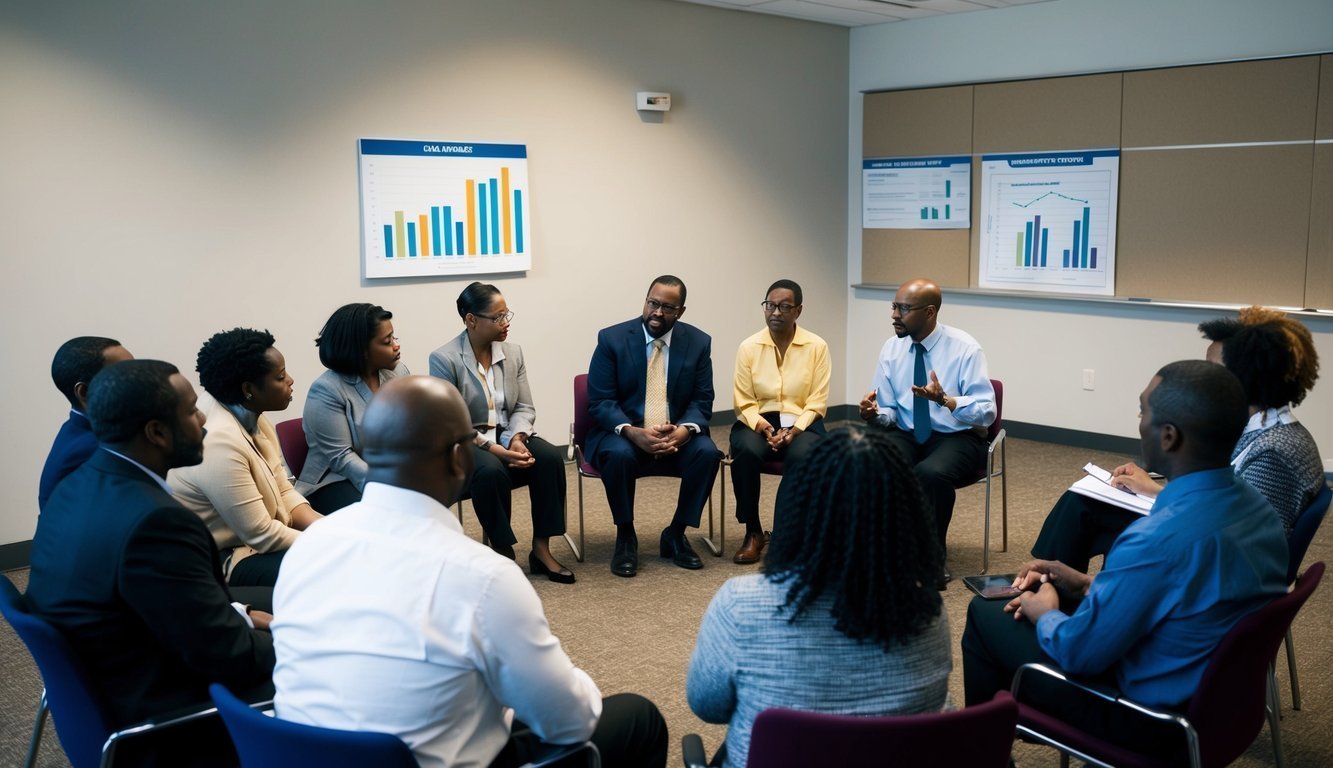PsychNewsDaily Publishers
100 Summit Drive
Burlington, MA, 01803
Telephone: (320) 349-2484
PsychNewsDaily Publishers
100 Summit Drive
Burlington, MA, 01803
Telephone: (320) 349-2484
Conflict in workplaces arises from task disagreements, personal clashes, value differences, and process disputes. Emotional intelligence and communication skills are crucial for effective resolution strategies.

Conflict is a natural occurrence in human interactions, particularly in workplaces. Identifying various types of conflict, leveraging emotional intelligence, and addressing root causes are essential for effective resolution.
Conflicts in the workplace can manifest in several ways. Task conflicts occur when team members disagree on how to approach projects or assignments, while relationship conflicts arise from personal differences or personality clashes.
Value conflicts emerge when individuals hold differing beliefs or ethical standards. Additionally, process conflicts arise from disagreements concerning procedures or methods.
Identifying these types of conflict aids in tailoring appropriate resolution strategies. For instance, task-related disputes can often be resolved through open dialogue and compromise, while relationship conflicts may necessitate mediation or team-building activities.
Emotional intelligence is pivotal in effectively managing and resolving conflicts. It encompasses self-awareness, self-regulation, empathy, and social skills.
Individuals with high emotional intelligence possess a greater understanding of their own emotions and those of others during conflicts, facilitating empathetic and constructive dialogue.
Self-regulation is vital for maintaining composure in tense situations, which helps prevent escalation. Empathy enables one to view conflicts from diverse perspectives, promoting understanding and compromise.
Effective social skills enhance negotiation and collaboration, resulting in resolutions that benefit all parties involved. Cultivating emotional intelligence can greatly enhance one’s ability to navigate and resolve workplace conflicts.
Biases and misunderstandings often contribute to workplace conflicts. Cognitive biases, such as confirmation bias or fundamental attribution error, can lead to inaccurate interpretations and assumptions regarding others’ intentions or actions.
Breakdowns in communication frequently result in misunderstandings, which may be caused by vague expectations, cultural differences, or varied communication styles.
Limited resources or competing interests can create perceived conflicts of interest. Recognizing these common triggers is essential for addressing underlying issues rather than superficial symptoms.
Addressing biases through training and encouraging clear, open communication can prevent many conflicts. Establishing shared goals and fostering a collaborative culture can further mitigate potential conflict sources.

Implementing effective conflict resolution strategies is vital for maintaining positive relationships and productive work atmospheres. These techniques enable individuals and groups to manage disagreements constructively and seek mutually beneficial solutions.
The Thomas-Kilmann Conflict Mode Instrument is a well-known tool for analyzing conflict resolution styles. It identifies five primary approaches:
This model aids individuals in understanding their default conflict resolution style and determining when to employ different strategies. By recognizing these patterns, people can adapt their approaches to fit varying situations and enhance their conflict management capabilities.
Competing means assertively pursuing one’s own objectives, often at others’ expense. This approach may be suitable in emergencies or when rapid decisions are needed.
Accommodating emphasizes the needs of others above one’s own. This method can be beneficial for preserving relationships or when the issue is more significant for the other party.
Avoiding involves evading or delaying conflict. While sometimes necessary to cool down emotions, excessive avoidance can lead to unresolved issues.
These techniques should be used thoughtfully, considering the specific context and desired outcomes of each conflict scenario.
Strong communication skills are essential for effective conflict resolution. Active listening allows parties to grasp each other’s viewpoints and needs.
Clearly and assertively expressing thoughts and emotions fosters mutual understanding. Utilizing “I” statements instead of accusatory language can mitigate defensiveness.
Non-verbal communication, including maintaining eye contact and open body language, also contributes significantly to building trust and rapport during conflict resolution.
Mastering these skills enables individuals to navigate conflicts more adeptly and cultivate stronger, more resilient relationships in both personal and professional spheres.

Effective communication is foundational for successful conflict resolution, involving the refinement of skills that promote understanding, empathy, and clarity in interpersonal interactions.
Active listening is a key aspect of effective communication. It necessitates complete attention to the speaker, fully grasping their message and providing considered responses.
Essential elements of active listening include:
By engaging in active listening, individuals can minimize misunderstandings and nurture respect and trust in conversations.
Open communication fosters an environment where all participants feel at ease expressing their thoughts and feelings. This openness nurtures transparency and builds trust among those involved in a conflict.
Empathy is crucial in this process and consists of:
Cultivating empathy fortifies relationships and encourages a more cooperative approach to problem-solving, allowing individuals to view conflicts from multiple angles for more effective solutions.
Misunderstandings frequently trigger conflicts, making it essential to address them promptly and effectively to maintain healthy relationships and resolve disputes.
Methods for resolving misunderstandings include:
Effective communication strategies assist individuals in navigating complex discussions and avoiding conflict escalation. By concentrating on clear, concise, and respectful communication, parties can collaborate to discover mutually beneficial solutions.

Acquiring effective conflict resolution skills is vital for managing disagreements and fostering positive relationships. These skills enable individuals to address conflicts constructively and seek mutually beneficial outcomes, preserving harmony across various settings.
Active listening is a fundamental component of effective conflict resolution. It involves fully focusing on the speaker, grasping their message, and responding thoughtfully. Empathy is fundamental in this process, allowing individuals to view situations from others’ perspectives.
Clear communication is another crucial skill for resolving conflicts. Articulating thoughts and feelings assertively yet respectfully helps to avert misunderstandings and encourages open discourse.
Emotional intelligence significantly contributes to conflict management. It entails acknowledging and regulating one’s own emotions while being sensitive to others’ feelings, aiding in maintaining calm during tense exchanges.
Patience is vital, allowing for thoughtful responses rather than impulsive reactions. It grants all parties the opportunity to express themselves and explore potential solutions.
Assessing the root causes of conflicts is essential for effective resolution. This process involves identifying underlying issues and distinguishing them from surface disagreements.
Encouraging brainstorming of multiple solutions promotes creativity and flexibility in conflict resolution. It is important to consider diverse perspectives and potential outcomes.
Objectively evaluating options aids in selecting the most suitable solution, which may involve weighing pros and cons or utilizing decision-making frameworks.
Implementing the chosen solution requires clearly defined action steps and follow-through. Regular check-ins help evaluate the effectiveness of the resolution and facilitate any necessary adjustments.
Identifying shared interests and objectives is crucial for discovering common ground. This focus on mutual benefits can transform the dialogue from confrontational to collaborative.
Negotiation techniques are integral to reaching compromises, which may include exchanging concessions, exploring alternative ideas, or brainstorming creative solutions that fulfill all parties’ needs.
Developing win-win outcomes necessitates a shift from competition towards cooperation, aiming to create results where all parties feel acknowledged in their interests.
Flexibility and a readiness to adjust one’s stance are crucial for successful compromise, demonstrating respect for differing viewpoints and facilitating resolution.

Successful conflict resolution requires ongoing evaluation and follow-up to ensure durable positive outcomes. Proper monitoring techniques can help pinpoint successful strategies and identify areas needing improvement in conflict management processes.
Regular check-ins following a conflict resolution are key. Schedule brief meetings or distribute surveys to assess participants’ satisfaction with the outcome. These follow-ups should occur at specified intervals, such as one week, one month, and three months after the resolution.
Establish a system to monitor key metrics, such as enhanced communication or reduced tensions. Utilize a simple rating scale for participants to evaluate their progress and the effectiveness of implemented solutions.
Encourage transparent feedback during follow-ups, allowing parties to discuss any lingering concerns or newly arisen challenges. Be ready to provide additional support or mediation if required.
Keep a record of all follow-up activities and outcomes. This documentation assists in recognizing patterns and informing future conflict resolution strategies.
Effective conflict resolution fosters stronger, more resilient relationships. Parties learn to communicate with greater openness and honesty, leading to enhanced trust and understanding.
Organizations benefit from heightened productivity and morale. When conflicts are constructively addressed, employees feel valued and acknowledged, contributing to increased job satisfaction and engagement.
Skills acquired through healthy conflict resolution extend to other areas of life. Individuals become more adept at managing disagreements within personal relationships and community contexts.
Success in long-term conflict resolution creates a positive cycle. As individuals experience the rewards of constructive problem-solving, they become more inclined to address issues at an early stage, preventing minor misunderstandings from escalating into significant conflicts.
Notably, reduced stress levels represent a significant long-term advantage. Effective conflict management strategies equip individuals to cope with tension and anxiety in challenging circumstances.
“`